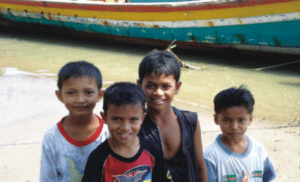Strengthening rights to the commons
The demographically debilitated families and communities (so many men, women, and children died in the 2004 tsunami) quickly revived their social institutions such as village committees, customary fishery organization, women’s groups among others. 160 young men and women from each of the 160 villages along the 400 km coastline of West Aceh were trained in community organization and fisheries
management. The representatives of the customary fisheries organization in each village, called Ihok, were keen to revitalize their customary rights and responsibilities over the land and sea space. They were involved in discussions on how to revive this. A participatory film on customary conflict resolution was produced. The district fishery authorities needed to respond to the pressures from the communities and saw merit in the idea of co-management and were open to become aware of its potentials.

Between 2007 and 2010, the Food and Agriculture Organization of the United Nations (FAO) initiated a process of contemporaneous action at the ‘local’ and the ‘macro’ levels and facilitated bringing together the three main stakeholders in the coastal fishery-the coastal community, the fisher organization and the district fishery administration-to set up fishery co-management centers in strategic places along the coast which were decided collectively by the three groups. The institutional arrangements-rules and norms-for these initiatives were put in place and the organizational arrangements for their implementation sanctioned by the district government. These co-management committees have the mandate for governing the land and sea space in the form of a community property right. They are collectively involved in rejuvenation of the corals and mangroves destroyed by the tsunami; they have stopped destructive fishing methods which were started as a result ill-informed post- tsunami development assistance and provided alternative fishing gear; they have participated in the formulation of a new province level fishery legislation , now before the province parliament, to foster greater coordination and more responsible fisheries development and management; and they are convinced that mainstreaming co-management is the right way forward to regulate, conserve, allocate and rejuvenate their community resources.
Key factors
The crucial factors that made this process possible were the facilitation, in the form of human capacity building, undertaken by a project the FAO initiated , combined with the favorable ‘initial conditions’ in Aceh province and a population recovering from three decades of conflict and thirty minutes of unprecedented devastation of the tsunami. These favorable conditions included:
- egalitarian social structures;
- strong religious faith;
- huge degree of trust in the community;
- long tradition of customary practices of coastal resource management;
- greater self-reliance (but with some dents caused by the tsunami aid!
Parties involved
The people and organizations involved were the coastal communities, Panglima Laot (a customary fisher organization), the district fishery departments, and FAO national staff as facilitator. Those benefited were coastal communities , small-scale fishers, and the district administrations.
IASC involvement
The FAO Advisor involved (also author of this case story) was an IASC member.
Also read: Kurien, J. Negotiating fisheries co-management in Aceh Province, Indonesia: Notes on Process. Rome : Food and Agriculture Organization of the United Nations, 2010.
Authored by: John Kurien, former UN/FAO Senior Fisheries Management Advisor in Cambodia and Indonesia, currently Researcher at Azi Premji University, Bengaluru, India

